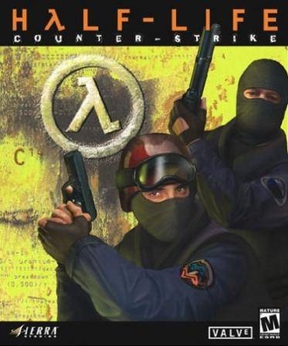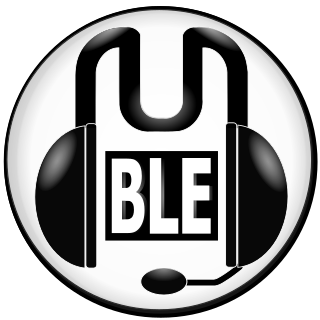
Counter-Strike is a tactical first-person shooter game developed by Valve. It was initially developed and released as a Half-Life modification by Minh "Gooseman" Le and Jess Cliffe in 1999, before Le and Cliffe were hired and the game's intellectual property acquired. Counter-Strike was released by Valve for Microsoft Windows in November 2000, and is the first installment in the Counter-Strike series. Several remakes and ports were released on Xbox, as well as OS X and Linux.

Team Fortress Classic is a first-person shooter game developed by Valve and published by Sierra Studios. It was originally released in April 1999 for Windows, and is based on Team Fortress, a mod for the 1996 game Quake. The game puts two teams against each other in online multiplayer matches; each member plays as one of nine classes, each with different skills. The scenarios include capture the flag, territorial control, and escorting a "VIP" player.
Source is a 3D game engine developed by Valve. It debuted as the successor to GoldSrc in 2004 with the releases of Half-Life: Source, Counter-Strike: Source, and Half-Life 2. Other notable third-party games using Source include Vampire: The Masquerade – Bloodlines, Dear Esther, and The Stanley Parable. Valve released incremental updates to the engine during its lifetime. Source was succeeded in 2015 by the release of Source 2.

The World Opponent Network was an online video game service, originally developed by Sierra On-Line as the Sierra Internet Gaming System (SIGS). SIGS-based and WON-based servers operated from 1996 until 2008.

Counter-Strike: Source is a tactical first-person shooter video game developed by Valve and Turtle Rock Studios. Released in October 2004 for Windows, it is a remake of Counter-Strike (2000) using the Source game engine. As in the original, Counter-Strike: Source pits a team of counter-terrorists against a team of terrorists in a series of rounds. Each round is won either by completing an objective or by eliminating all members of the enemy team. The game was initially bundled with all retail and digital copies of Half-Life 2, before being released standalone.

GameSpy was an American provider of online multiplayer and matchmaking middleware for video games founded in 1999 by Mark Surfas. After the release of a multiplayer server browser for Quake, QSpy, Surfas licensed the software under the GameSpy brand to other video game publishers through a newly established company, GameSpy Industries, which also incorporated his Planet Network of video game news and information websites, and GameSpy.com.

Action Quake 2 is a mod for the video game Quake II created by The A-Team. Action Quake 2 was developed to recreate the look and feel of an action movie, having a fast pace and a semi-realistic damage system. It features many maps recreating realistic settings, such as city streets and office buildings, with a balanced range of weapons and equipment inspired by action movies.
Soldat is a 2D multiplayer video game for Microsoft Windows. It is a run and gun game influenced by Liero and Scorched Earth, combined with elements from Counter-Strike and Worms.

Half-Life 2: Deathmatch is a multiplayer first-person shooter video game developed by Valve. Released on Steam on November 30, 2004, it uses many of the assets from Half-Life 2 and its Source engine. It features new levels, optimized for multiplayer arena play, and a few new weapons. Also included are portions of the game's source code, which were the basis for many early Source-based multiplayer modifications. The game is the successor to the popular multiplayer component of the original Half-Life, but is offered as a separate product from Half-Life 2. Deathmatch, like Half-Life's multiplayer, does not develop any part of the plot or story of the Half-Life series.

Valve Anti-Cheat (VAC) is an anti-cheat tool developed by Valve as a component of the Steam platform, first released with Counter-Strike in 2002.

Black Widow Games was a video game developer specializing in promotional mods for Quake and Half-Life 3D engines. They are best known for their They Hunger series. Prominent members included Neil Manke, Einar Saukas, and Magnus Jansén. The company business model is based on developing contract-work mods for the marketing campaigns of customer companies and products, freely distributed for promotion.
Gameplanet was a video gaming website that provided news, reviews, previews, videos, and other information. It was the largest video gaming website in New Zealand. Gameplanet New Zealand despite having the same name with the biggest specialized videogame retailer in Mexico, has no connection to Gameplanet S.A.. Gameplanet nalso operated GP Forums, an online forum community site covering video games as well as various other topics.

The Orange Box is a video game compilation containing five games developed and published by Valve. Two of the games included, Half-Life 2 and its first stand-alone expansion, Episode One; had previously been released as separate products. Three new games were also included in the compilation: the second stand-alone expansion, Half-Life 2: Episode Two; the puzzle game Portal; and Team Fortress 2, the multiplayer game sequel to Team Fortress Classic. Valve also released a soundtrack containing music from the games within the compilation. A separate product entitled The Black Box was planned, which would have included only the new games, but was later canceled.

Counter-Strike Online (CSO) is a tactical first-person shooter video game, targeted towards Asia's gaming market released in 2008. It is based on Counter-Strike and was developed by Nexon with oversight from license-holder Valve. It uses a micropayment model that is managed by a custom version of Steam.

Mumble is a voice over IP (VoIP) application primarily designed for use by gamers and is similar to programs such as TeamSpeak.

NeoTokyo is a multiplayer tactical first-person shooter total conversion modification of Half-Life 2 in a futuristic cyberpunk setting, created by American developer Studio Radi-8. Initially released on 3 July 2009, and later re-released for Steam on 4 July 2014, it was voted to be released through Steam Greenlight on 16 October 2012. The game presents itself in a dystopian setting, with inspiration drawn from Akira, Deus Ex and Ghost in the Shell for its art-style, music and aesthetics.

Counter-Strike: Global Offensive (CS:GO) is a 2012 multiplayer tactical first-person shooter developed by Valve and Hidden Path Entertainment. It is the fourth game in the Counter-Strike series. Developed for over two years, Global Offensive was released for OS X, PlayStation 3, Windows, and Xbox 360 in August 2012, and for Linux in 2014.












